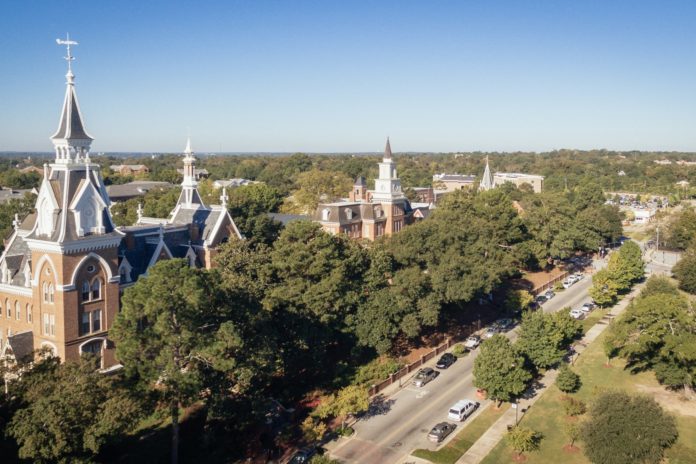ATLANTA – Noted author and professor of science and theology Dr. Robert J. Russell told an audience at Mercer University on Tuesday that there are paths between science and theology and both can find value in interaction. He spoke at Mercer’s James and Carolyn McAfee School of Theology, delivering the second annual D. Perry and Betty Ginn Lecture on Christian Faith and Modern Science.
Dr. Russell is founder and director of the Center for Theology and the Natural Sciences and a professor at the Graduate Theological Union in Berkeley, Calif. He used his address to take on some common historical misconceptions about the roles of science, philosophy and religion.
“Philosophy mediates between theology and science,” Dr. Russell said. “Science doesn’t prove God, but it does show that life is very much at home in this universe. This is not a proof of God, but an invitation to take the universe and give it a sense of purpose and value in a way that the science I grew up with did not.
“It isn’t as much of a leap to say that God created the universe as it is to say there are an infinite number of universes out there,” he said. “It tends to be unanswerable because it’s beyond the laws of science and observation.”
Dr. Russell has spent his career studying these interactions. An ordained minister in the United Church of Christ, he is a member of the Society of Ordained Scientists and has written or edited numerous books on science and theology. He holds a Ph.D. in experimental physics from the University of California, Santa Cruz, an M.Div. and an M.A. in theology and science from the Pacific School of Religion and an M.S. in physics from the University of California Los Angeles. As an undergraduate at Stanford University, he triple majored in physics, religion and music.
One example of philosophy influencing science surrounded the big-bang theory on the creation of the universe. Dr. Russell said some theorized a single event beginning the universe, while physicists say this creates the paradox: “how could the universe have a beginning?”
A competing theory, called the steady state or ever-expanding universe theory, was rejected by Albert Einstein in 1927 and called “an abomination.” But in1931, after reviewing the theory and considering his own position, Einstein changed his mind and called his original opinion his “greatest blunder.”
“In my opinion,” Dr. Russell said, “this shows that philosophy can play a creative role in science” because evidence can be proven false as part of the scientific process. The big-bang theory and the steady state theory are still being debated today, Dr. Russell said, and philosophical and theological considerations influence theory choice.
Objections to the big-bang theory have also arisen on theological grounds. Some said the theory supported creation, while others disagreed, saying it would promote atheism. Other scientists said if the theory is relevant to theology, it should be abandoned.
Dr. Russell said he thinks science is only indirectly relevant to theology. “Science provides confirmation for theology and science and theology are in consonance with each other,” he said. “Science plays a secondary role in Christian faith, which primarily has its basis in scripture, tradition, reason and experience.”
Even though the theory of evolution is often vilified by Christians, Dr. Russell said for believers, theology can offer an explanation. “Evolution biology requires a specific set of circumstances to exist. There’s a very subtle connection to God, because if any of the circumstances had been any other way, we wouldn’t be here.
“The existence of life puts constraints on the type of physics you have,” he said. “It ties physics and biology together. It’s not a design argument, it’s an argument against cosmic meaningless. Philosophy mediates between theology and science.”
The Ginn Lectures were endowed at Mercer’s McAfee School of Theology by the Rev. Dr. D. Perry Ginn to encourage a deeper understanding by clergy and students of science and how it relates to the Biblical revelation. Dr. Ginn is former pastor of several Georgia congregations, including First Baptist Church, Gainesville, and Peachtree Baptist Church in Atlanta. He is semi-retired and serves as pastor of the North Clarendon Baptist Church in Avondale Estates, Ga.
— 30 —










